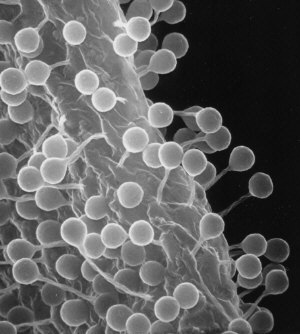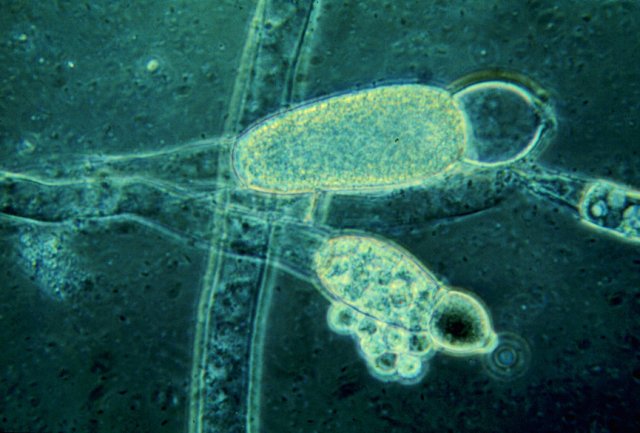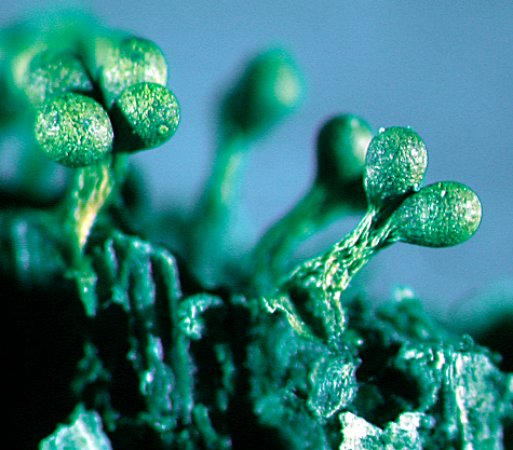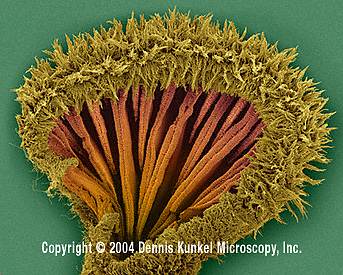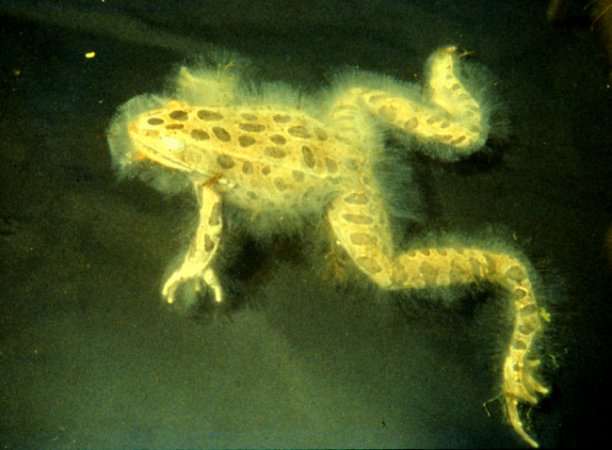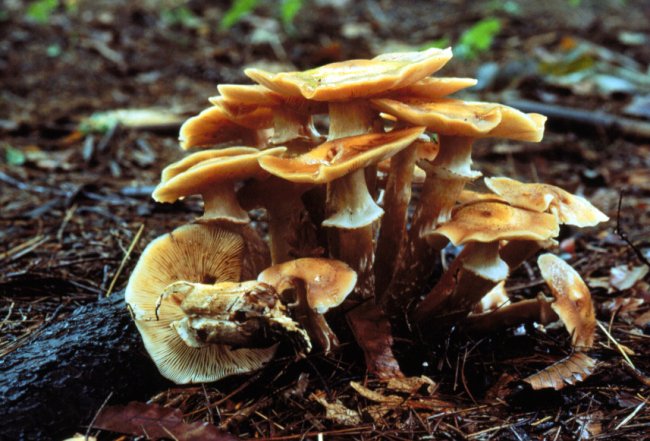Biology of Fungi - BIOL 4848/6948 Spring 2007 Semester, Course Codes 0396 and 0430 |
||||||
Lecture topics, corresponding text material, examinations, and special notes related course items/deadlines are provided below for given dates throughout the semester. Lecture outlines, as QuickTime movies, are accessible through the white button links.* The associated text material for a particular lecture topic on a given date is represented as follows:
Students can access monthly portions of the BIOL 4848/6948 course calendar through the links represented by the buttons below: In addition, specific course calendar dates/assignments can be immediately viewed through the underlined quick links provided throughout this web page. * You must read the Copyright Statement regarding the restricted use of these documents before downloading them. In addition, please note that the animations within the slides typically do not function and that some of the attributions to certain images have been inadvertantly 'blackened out' by an unknown glitch during the conversion of the PowerPoint lecture presentation to QuickTime (.mov) format. Finally, these lecture slide movies are meant solely for the educational purposes of students enrolled in this course (BIOL 4848/6948). Their use outside of this course for non-educational purposes, either in the same or modified form, is strictrly forbidden. Tuesday, January 16th Introduction to Biology 4848/6948 Thursday, January 18th Assignment:
Deacon - Chapter 1
Tuesday, January 23rd Assignment:
Deacon - Chapter 2
Thursday, January 25th Lecture
Topic: The
Diversity of Fungi and Fungus-like Organisms (cont.)
Tuesday, January 30th Syllabus
Acknowledgement Form Due!
Lecture Topic: Fungal Structure and Ultrastructure   in QuickTime (.mov) format Assignment: Deacon - Chapter 3 Recommended additional reading material can be found in Chapters 3-6 in Gow and Gadd Thursday, February 1st Lecture
Topic: Fungal
Structure and Ultrastructure (cont.)
Tuesday, February 6th Lecture
Topic: Fungal
Growth
  in QuickTime (.mov) format Assignment: Deacon - Chapter 4 Recommended additional reading material can be found in Chapters 1 and 13 in Gow and Gadd Thursday, February 8th Lecture
Topic: Fungal Growth
(cont.)
Tuesday, February 13th Examination
I (take home)
covers material from January 18th through February 8th Wednesday, February 14th Examination I due
to Turnitin.com by 11:00 AM
Thursday, February 15th Tuesday, February 20th Term Paper
Research Day I
Details to be announced in class Thursday, February 22nd Term Paper
Research Day II
Tuesday,
February 27th
Thursday, March 1st Lecture
Topic:: Differentiation
and Development (cont.)
Tuesday, March 6th Lecture
Topic: Environmental
Conditions for Growth
and Tolerance of Extremes   in QuickTime (.mov) format Assignment: Deacon - Chapter 8 Thursday, March 8th Examination
II (take home)
covers material from February 15th through March 6th Friday, March 9th Examination
II due to Turnitin.com by 11:00 AM
Monday,
March 12th through Friday, March 16th
No Lectures – Spring Break Tuesday, March 20th Lecture
Topic: Fungal Metabolism
and Fungal Products   in QuickTime (.mov) format Assignment: Deacon - Chapter 7 Recommended additional reading material can be found in Chapter 10 in Gow and Gadd Thursday, March 22nd Lecture
Topic: Fungal Metabolism
and Fungal Products (cont.) Tuesday, March 27th Lecture
Topic: Fungal Genetics, Molecular
Genetics, and Genomics   in QuickTime (.mov) format Assignment: Chapter 9 Recommended additional reading material can be found in Chapters11 and 12 in Gow and Gadd Thursday, March 29th Lecture
Topic: Fungal Genetics, Molecular
Genetics, and Genomics (cont.) Tuesday, April 3rd Tuesday, April 4th QUEST
report due to Turnitin.com by 11:00 AM
Thursday, April 5th Lecture
Topic: Fungal Spores, Spore
Dormancy, and Spore Dispersal   in QuickTime (.mov) format Assignment: Chapter 10 Tuesday, April 10th Lecture
Topic: Fungal Spores, Spore
Dormancy, and Spore Dispersal (cont.) Thursday, April 12th Examination III (take home)
covers material from March 20th through April 10th Friday, April 13th Examination III
due to Turnitin.com by 11:00 AM
Tuesday, April 17th Student Presentation of
Chapter 11:
Fungal Ecology: Saprotrophs Thursday, April 19th Student Presentation of Chapter 12: Fungal Interactions: Mechanisms and
Practical Exploitation
Monday, April 23rd Mycology Essay due to Turnitin.com due by 11:00 AM Hard Copy of Mycology Essay due by 12:00 PM Tuesday, April 24th Student Presentation of Chapter 13: Fungal
Symbiosis
Thursday, April 26th Student Presentation of Chapter 14: Fungi
as Plant Pathogens
Tuesday, May 1st Student Presentation of Chapter 15:
Fungal Parasites of Insects and Nematodes Thursday, May 3rd Exam IV (in class)
- covers student presentations
Friday, May 4th All
Students:
Notify Dr. Cooper by 5:00 PM if you wish to take the OPTIONAL final examination Grad Students Only: Laboratory Report due to Turnitin.com due by 11:00 AM Laboratory Notebook and Hard Copy of Laboratory Report due by 12:00 PM Tuesday, May 8th OPTIONAL Final Examination –
Comprehensive (in class)
1:00 - 3:00 PM in Ward Beecher Hall, Room 3022 |
Course
Related Links
Dr. Cooper's
Contact Information
Office Hours: (WBSH, Room 4015) - Mondays - Fridays, 11:00 AM - 12:00 PM - Other times by appointment only Telephone/Voice Mail: 330.941.1361 Email: crcooper01@ysu.edu
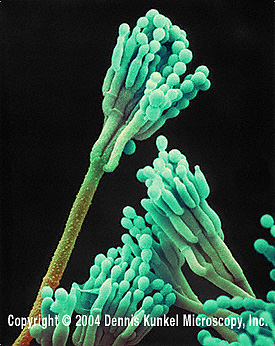
 A false colored image
of the budding yeast Saccharomyces
cerevisiae
as observed under a scanning electron microscope. This image is used
with the expressed permission of Dr. Dennis Kunkel, who also holds the
copyright to this and other images used throughout this course web
page. To see more stunning images like the above, as well as
other
microbes, visit Dr. Kunkel's web page at www.denniskunkel.com.
A false colored image
of the "split gills" of the bracket fungus Schizophyllum commune
as observed under a scanning electron microscope. This image is used
with the expressed permission of Dr. Dennis Kunkel, who also holds the
copyright to this and other images used throughout this course web
page. To see more stunning images like the above, as well as
other
microbes, visit Dr. Kunkel's web page at www.denniskunkel.com.
Fuiting
bodies of the mushroom Armillaria. This photograph is
provided courtesy of Dr. Jim Anderson via the following website: www.bsu.edu/classes/ruch/msa/anderson.html.
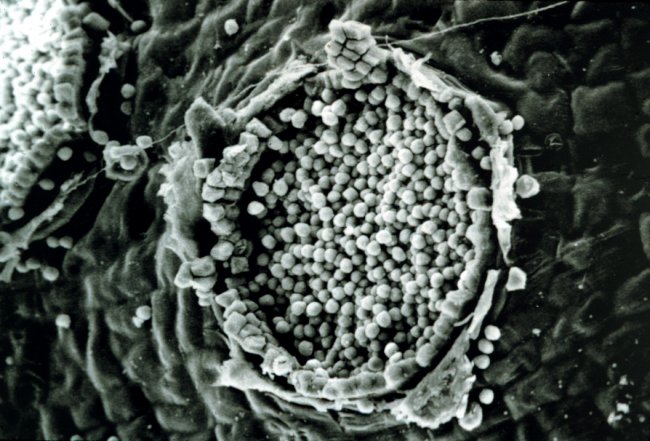 An
aecium with accompanying aeciospores. This scanning
transmission electron micrograph is provided courtesy of Dr. C. W. Mims
via www.bsu.edu/classes/ruch/msa/mims.html.
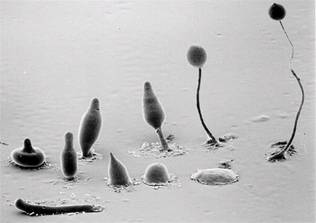 Scanning
electron micrographs of various life cycle stages of Dictyostelium discoideum, a
fungus-like microbe belonging to the Mycetozoa. (Source:
www.spectrosciences.com)
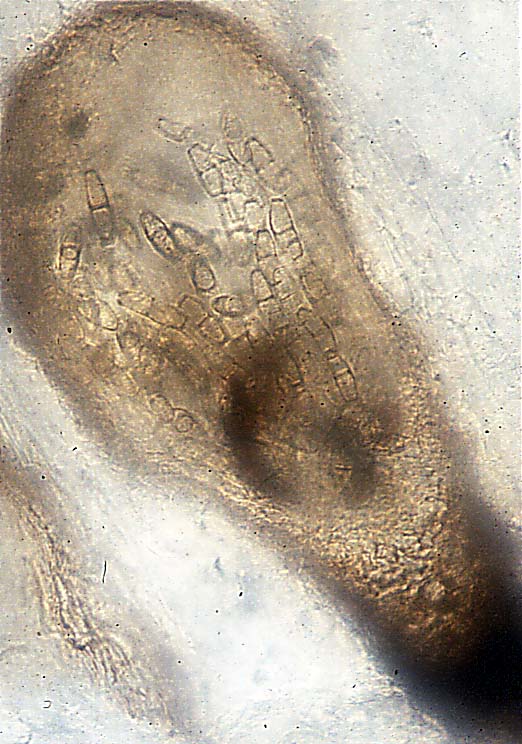 Fossilized
perithecium of what is believed to be a fungus of the genus
Savoryella. Note the ascospores within the ascocarp.
(Source: www.ucmp.berkeley.edu/fungi/fungifr.html)
|
|||||
|
|
||||||
This web page was
created using the Composer function of Netscape 7.2. Buttons used in this
web page were created using ButtonGenerator.
Viewing This Web Page: The web pages associated with this course were produced by Dr. Cooper using the Composer function of Netscape 7.2. While most web page browsers will read these electronic documents, their structural integrity seems best served by Netscape 7.2 and above.
Copyright © 2005-2007 Chester R. Cooper, Jr.

web page were created using ButtonGenerator.
Viewing This Web Page: The web pages associated with this course were produced by Dr. Cooper using the Composer function of Netscape 7.2. While most web page browsers will read these electronic documents, their structural integrity seems best served by Netscape 7.2 and above.
Copyright © 2005-2007 Chester R. Cooper, Jr.
































